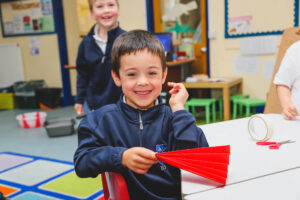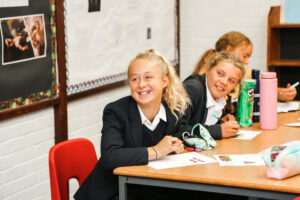‘Exams’ is a word that has been doing the rounds in the Prep School this week. Unsurprising, really: our internal exam week (for Years 5-7) began on Monday, and the Year 8s are making the most of their final few lessons before their Common Entrance tests begin after half term. French listening, French orals and Maths arithmetic, as well as Geography coursework, have already taken place, of course, and the Year 8s go into half term knowing that they have already secured themselves some of the marks they need to meet with CE success and to gain those hallowed places at their senior school of choice. As internal exam week draws to a close and the staff look forward to a happy half term of marking, it’s worth stopping to think about the value we place on internal exams.
My view of internal school exams at Key Stage 2 (Years 3-6) and Key Stage 3 (Years 7-9) – and I know that Mr Bartlett and his Heads of Department agree – is that their principle function must be a formative one. That is to say that – cliché alert – they ought to be more about process than product. Yes, we want pupils to take exams seriously; yes, we want them to work hard; and yes, we encourage them to see exams as important and worthy milestones, but there must sit alongside this sense of importance a sense of balance and perspective.
The exams are a chance to practise revision techniques and exam skills, to review them, to refine them, to throw them out and start all over again. They are a chance to get to grips with the revision process, with what works for you (and what doesn’t), and a chance to have a crack at putting in place a solid and structured programme of recapping and preparing. They are a chance to learn, perhaps the hard way, that steady and conscientious work throughout the year serves you better than obsessive cramming; and a chance to be exposed to (and, with help, respond appropriately to) some stress, some pressure, and some anxiety.
Whilst it is absolutely right that pupils should want to achieve good results in their exams (and I stress here that achievement in these things is absolute rather than relative – ie what matters is how you do, not how everybody else does), it is also important to encourage the children to consider these results as just part of their year’s worth of learning. I have been known to ask a very anxious pupil what it is that is causing him so much anxiety about exams; what is he afraid will happen if it all goes wrong? What would happen – actually – if he were to mess up horribly most of his (say) end-of-Year-6 exams? The answer is that he would carry on into Year 7 with everyone else, but with the experience of having fouled up, of having got things wrong, of knowing that some new techniques will be needed next time round. And that’s it. Because there is a next time. That’s an important perspective to have, and our feedback week after half term will be a useful forum for that message to get across loud and clear.
As for balance: woe betide the pupil who gets to the Trinity term and tells me that they are going to have to give up their activities/stop playing cricket/take a break from their music group/spend each lunchtime in the library because of their revision! Good emotional health, resilience and a grounded approach is what we’re after, and that’s why continuing with clubs and societies and continuing to socialize and have fun whilst also getting on with some revision is so important. That’s also why we’ve continued with our Morning Worship Assemblies, our Wellbeing Sessions, our clubs and activities, and with Games lessons throughout this internal exam week. I talk a lot about balance and perspective, and they are two words which I would certainly shout from the rooftops even more loudly when it comes to exams.
Key Stage 2 and 3 internal exams are an important part of the educational journey, but they are neither the destination nor our reason for travelling. They exist to prompt, not to define. And they are a really good chance to practise – whether as a pupil, a teacher, or a parent – getting the balance right.
And to our Year 8s – well done. Well done for all your hard work thus far. Well done for the revision that you’ve been doing, the extra sessions you’ve been attending, for going along to Mr Bartlett’s Revision Skills workshop and the Heads of Departments’ Exam Skills Evening, for asking questions, for the practice papers you’ve done, and for navigating what are always some fairly stressful waters. Many of you have secured your senior school places already, and some of you need to seal the deal with a good performance during CE week after half term. Whichever of these categories you fall into, there’s a good deal of pride that comes from a job well done and from knowing that you have worked hard to do yourself proud. Keep up the good work over the half-term break and remember these key pointers: an hour’s work before lunch is worth two in the afternoon, so get up early; be clear about which subject and which topic you are going to revise; give yourself regular breaks; be active in your revision (making notes, condensing them, testing others) rather than just reading a text book; ask for help if you need it; keep your revision space a device-free zone (difficult, but important); making a revision timetable is not actually revision; use your afternoons and evenings to relax with the family and have fun; and talk to them if you’re feeling stressed. And remember that, once CE week is done, a glorious few weeks of adventure, enrichment and learning new skills awaits.
Happy half term to you all.







